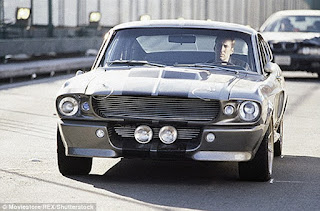So this is one of the movies everyone
was buzzing about this awards season. The semi-auto-biographical,
coming of age tale is written and directed by actress (now director)
Greta Gerwig, and stars Saoirse Ronan. Lauded by critics, the film
won Best Comedy at the Golden Globes and earned an Oscar nomination.
All the critics seemed to agree this movie was AMAZING! I was
skeptical, though. I had a feeling this would be just another story
about a quirky outsider who has a fraught relationship with a parent,
dealing with the tricky teen issues of friendships, sex, and finding
her identity, and it turns out I was right.
Saoirse Ronan plays Christine, a teen
who has decided to go by the name Ladybird. For Ladybird, renouncing
her given name is a way of distancing herself from her family, their
modest financial circumstances, and her town of Sacramento, which she
feels has no culture. Her family really isn't all that poor; she just
goes to a fancy private school (on scholarship), where most of the
kids have fancy cars and big houses, which she does not. Ladybird is
bright but lazy, and her grades don't support her dream of getting
into an East Coast liberal arts college. Neither does her mom, who
tends to be pretty hard on the girl. When the guidance counselor
tells Ladybird, “It's my job to help you be realistic,” Ladybird
says, “Yeah, that seems to be everybody's job.”
Ladybird goes through the usual stuff,
experimenting with sex and drugs, and feeling sorry for herself. As
befits her callow age, she is completely oblivious to everyone else's
problems. She falls for a guy in her theater class, and is bummed
when her chubby friend, Julie, gets the juicy role opposite him,
complaining, “Now you get to be all romantic with Danny on stage.”
When Julie replies, “Yeah, that's realistically the only chance
I'll get to do that,” Ladybird is totally unmoved by the pathos of
Julie's life as the less attractive friend. This pattern repeats
itself again and again, as Ladybird focuses on her own
disappointments, failing to see that everyone has a struggle.
This is, of course, very realistic for
a girl her age. “Lady Bird” is full of realistic touches, from
Saoirse Ronan's visible acne, to the hot girl at their school, who
isn't objectively all that hot.
The key relationship in the film is
that between Ladybird and her mom. As with many teenage girls, it's
a rocky one. Marion (Laurie Metcalf) is pretty critical of her
daughter, and she often vents her general frustrations on her.
Ladybird is just a callow teen, un-driven as a student, and
insensitive to the hurt she inflicts on her parents by being so
obviously ashamed of their small house and modest car.
There is really nothing not to like
about “Lady Bird,” except perhaps for the slightly clunky ending,
which I actually liked. It's an ending that doesn't wrap things up
in a neat package, with Ladybird suddenly becoming a better person or
having the perfect life. This is an ending that makes clear that
this is still the same girl, with the same issues, but starting to
grow up a little.
It's an enjoyable movie, but I can
only explain the outsized hype surrounding it as sexism. With the Me
Too and Time's Up movements going on, this is an Up With Women kind
of year, and everyone in Hollywood wants to celebrate movies made by
women. It's a laudable instinct, but it has led to virtual
canonization of what is really a pretty basic girl's-coming-of-age
movie. There are any number of better, more memorable films from
this genre, including "Me Without You" and "An Education". Once this year's hype dies down, “Lady Bird” will still be worth
checking out, but I doubt we will still be talking about it in 10
years.
3 stars out of 5







